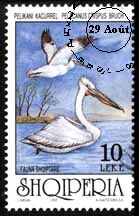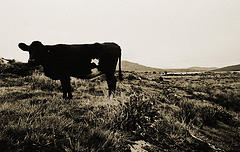Last Thursday at 10.48 in the morning, my very soul was pierced by the darning-needle of destiny. It was raining, one of those summer showers, and I was walking along near the canal thinking about Trebizondo Culpepper, a recent enthusiasm of mine. If you do not know of Culpepper, it would be well worth you finding out, but right now I have no time to tell you why I had become so keen, some might say obsessive. There are other forms of Trebizondo, and indeed other Culpeppers, that much I know.
You may recall that Little Eva once sang about doing the locomotion. I was not doing it myself that morning, I was just walking, or plodding, but at 10.43, just ahead of me on the canal side, a large number of ghouls disembarked from a yellow bus, and they began to do the locomotion. They had to choose some way of getting from their bus to the barge they were due to board. Being ghouls I thought they may just flit or shimmer, but no, they did the locomotion, and they did it slowly. In order to continue on my way I would have to pass among the ghouls, and this caused me to pause.
I have never been remotely frightened of phantom forms, be they ghosts or ghouls or mere blobs of ectoplasm. Dangling from a ribbon round my neck is a tungsten prong. Tungsten is also called wolfram, the only metallic element named after two quadruped mammals, so you can see why I was safe from ghouls. The reason I paused was because I was concentrating so hard on Trebizondo Culpepper, and I could not help wondering what the correct approach should be of a Trebizondo Culpepper devotee to a busload of ghouls. I was not yet an adept, but I planned to be, and I saw this as a test. It was now 10.44.
All the ghouls had now left the bus, and they were doing the locomotion very slowly as they crossed towards the canal where their barge awaited them. The bus was driven away by its top-hatted driver. Its growling engine alarmed some crows in a tree, and their wings made a loud flapping noise as they flew away. I had no wings to flap, of course, but would an adept of Trebizondo Culpepper flap something at ghouls? I did not know the answer to this question, but I noticed that there was a pneumatic postal chute box on the ground only a few feet away. Hastily, I scribbled a note to my mentor and inserted it into the slit atop the box.
You will think me presumptuous, perhaps, to expect a reply from my mentor so rapidly. I think I had been spoiled. The mentor who had been assigned to me after that meeting in the civic centre assured me that my questions and concerns would be answered by return of pneumatic post chute, that is, almost instantaneously, and for a month now that had indeed been the case. So I stood like a ninny, shifting from foot to foot, fiddling with my tungsten prong, as the rain fell and the ghouls locomoted with agonising slowness across my path. I was not to know that my Trebizondo Culpepper mentor lay sprawled on a mat in a distant time zone, his brain laid waste by the fumes from a jar of some expensive, blissful gas. He had not seen fit to tell me of his holiday plans.
I waited by the box for three minutes. The leading ghouls had now boarded the barge, but there were so many of them that they still blocked the towpath, and some seemed not to have moved at all from where the yellow bus had dropped them off. I knew, somehow, that I was not going to get the advice I sought from my mentor. I turned my back on the pneumatic postal chute box, disappointed and angry, and so I passed the final sixty seconds of my old life.
It is all very clear to me. The rain was falling from puffy black clouds, there was not a patch of blue to be seen in the sky. The padlock on the box was rusty, and the yellow paint on the box itself was flaking. Over in a field, a cow stood staring blankly at a squirrel. Gusts of wind disturbed my hairstyle, but I had left my comb at home on the mantelpiece. Jam sandwiches and paper cups of Tizer were being distributed to the poor from a kiosk by the bridge. There was a bedraggled duck in a pond and a coat hanger in a puddle. The crows had flapped back to the tree and they were perched, cawing. The tenets of Trebizondo Culpepper burned in my brain. I could hear the distant hum of milk floats and the whirring of bicycle wheels. The pathway was becoming ever muddier as the rain poured down, and a couple of earthworms had slithered to the surface to wriggle blindly in the muck. I thought I saw the yellow bus again, in the distance, going in the direction of the abandoned vinegar brewery. I ran my tongue over my teeth and dislodged a fragment of sausage.
And then I took a deep intake of breath and ran, I ran towards the slowly locomoting ribbon of ghouls strung across my path. I puffed out my chest and I whirled my arms and I thought of Trebizondo Culpepper. And at 10.48 on that Thursday morning I passed through the ghouls, and the darning-needle of destiny pierced my very soul.
It is a week later now, Thursday again, and I am sitting in a chalet on a wind-racked beach, staring out to sea. I am holding my soul nestled on my lap, and it is aglow, pulsating with the glory of Trebizondo Culpepper. And I am staring out to sea.


















